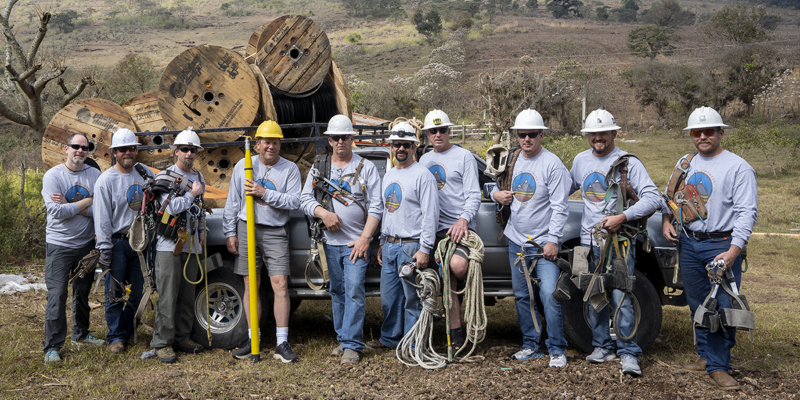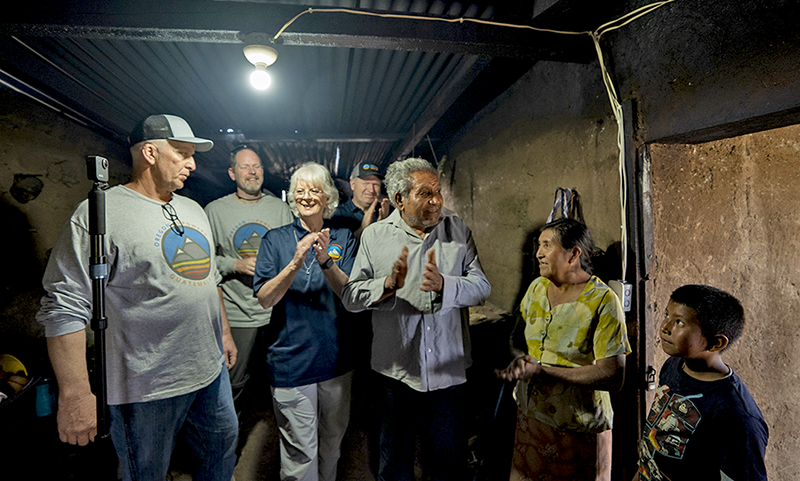Oregon Cooperatives Light Up Guatemalan Village

In March, a team of volunteer electric cooperative line workers from Oregon helped bring electricity to the rural town of Ventura, Guatemala. CFC and NCSC were happy to assist the effort with grants totaling $95,000.
Organized by the Oregon Rural Electric Cooperative Association (ORECA) in collaboration with NRECA International, the trip to Guatemala was the first international project undertaken by Oregon cooperatives. It was originally supposed to take place in 2020, but was delayed due to COVID-19.
“ORECA started exploring an international project in 2018, bringing the statewide manager of Indiana to our summer meeting to talk about their experience,” said ORECA Executive Director Ted Case. “Our board endorsed moving ahead and we were prepared to go to Guatemala in April 2020, before the pandemic shut down the program.”
The three-year delay caused some changes to the original plan, including the makeup of the group of participating Oregon line workers, the team lead and even the village to receive electricity.
But that didn’t stop the resolve of the Oregon Empowers team. And when the group of 10 volunteers from seven Oregon cooperatives finally arrived in the village of Ventura, east of Guatemala City, they set to work.
“We broke into several crews. Initially, we focused on classic line work—installing anchors, framing poles and pulling wire,” said Team Leader Charlie Tracy from Oregon Trail Electric Cooperative (OTEC). “The crews worked alongside local villagers and workers from the local municipal utility, Empresa Electrica Municipal De Jalapa. A lot of bonds were formed during those first days.”
 Photo Credit: Mike Teegarden.
Photo Credit: Mike Teegarden.
Rolling with the Punches
Despite months of planning, things didn’t always go as anticipated.
“When we arrived, we realized that some of the prep work hadn’t been completed,” Tracy said. “We were told that the poles and anchors would all be installed before our arrival. But due to the rocky soil and harsh digging conditions, some of the holes were not dug, or had not been dug deep enough.”
“On top of that, the transformers and insulators weren’t there when we arrived. We were a little panicked on that first day, but our local support assured us the equipment would arrive in a few days and thankfully it did. It did delay the project, because the linemen had to climb each pole several times to finish each structure. Also, the eucalyptus poles the guys were climbing are more challenging than what we’re used to, so that slowed us down a bit, too.”
In order to ensure the project would be completed on time, the crews worked 10- to 12-hour days for the first week.
The villagers helped as well. “They dug the holes for most of the anchors and poles,” Tracy said. “They also helped pull wire and anything else we asked them to do.”
In the end, the Oregon Empowers team connected about 30 village buildings and nearly 200 residents to the grid—and finished with about a half day to spare.
Overall, the project involved 42 poles, 2.8 miles of primary line, 1.8 miles of secondary line and seven transformers. Each village home received four lights, two switches and two outlets.
On the final day, there was a “lighting ceremony” to celebrate the team’s success.
“One of my lasting memories will be seeing two of the ladies holding back tears when the lights were turned on for the first time in their homes,” said Lineman Clinton Curtis from Hood River Electric & Internet Cooperative. “Bringing electricity to this underserved village is what cooperatives are all about.”
“I am so grateful for the opportunity to participate in this project as it has been a life-changing experience, not only for the community of Ventura, but for myself as well,” said Lineman Shawn Foultner from Consumers Power.
“It was clear from the first day the team got together that the guys had big hearts and really wanted to help this village,” Tracy said. “That feeling intensified as we got to know the villagers. Oregon could not have sent a better team to represent them.”
Villagers Benefit from Lower Costs, More Free Time
Electrification will benefit Ventura in multiple ways.
“These families will pay less in utility bills then they did before in candles, batteries and spoiled food due to lack of refrigeration,” Tracy said.
Corn is a staple of every meal, and grinding corn was done by hand. Now, the residents can save time and energy during the day by having electric appliances help them prepare meals. In the evenings, there will be quality light to enable the kids to do their homework.
Using electricity will also be healthier for everyone. “All the families cooked over open fires inside the home, which creates very bad air quality,” Tracy said. “There were times when I had to step out of a house to catch my breath, the smoke was so heavy.”
One of the Best Projects ORECA Has Ever Done
“I think this is one of the best projects this statewide has ever done,” Case said. “Oregon is not a big cooperative state, and this was an ambitious project for us. Without the CFC and NCSC grants, this would have been a very difficult project for us to fund.”
“I think what we showed, with the support of CFC and NCSC, is that any state can do this if they have strong leadership,” Case continued. “For us, Les Penning, CEO of OTEC, was a tremendous committee chair.”
Tracy added: “I think I speak for everyone involved in the project when I say how grateful we are to have been part of the project and to our members and financial supporters like CFC for giving us the opportunity to do this work.”